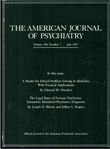Insanity defenses: contested or conceded?
Abstract
The authors examined 316 Oregon criminal cases in which the accused successfully pleaded the insanity defense. Prosecutors agreed to the insanity verdict in more than four out of five cases. In most cases all examining experts diagnosed the defendant as psychotic. The smaller number of defendants who were diagnosed by the state hospital staff as displaying only personality disorders accounted for a disproportionately large percentage of the contested trials. Observing that Oregon's insanity defense system is run by consensus, the authors suggest a reorientation of the insanity defense debate.
Access content
To read the fulltext, please use one of the options below to sign in or purchase access.- Personal login
- Institutional Login
- Sign in via OpenAthens
- Register for access
-
Please login/register if you wish to pair your device and check access availability.
Not a subscriber?
PsychiatryOnline subscription options offer access to the DSM-5 library, books, journals, CME, and patient resources. This all-in-one virtual library provides psychiatrists and mental health professionals with key resources for diagnosis, treatment, research, and professional development.
Need more help? PsychiatryOnline Customer Service may be reached by emailing [email protected] or by calling 800-368-5777 (in the U.S.) or 703-907-7322 (outside the U.S.).



